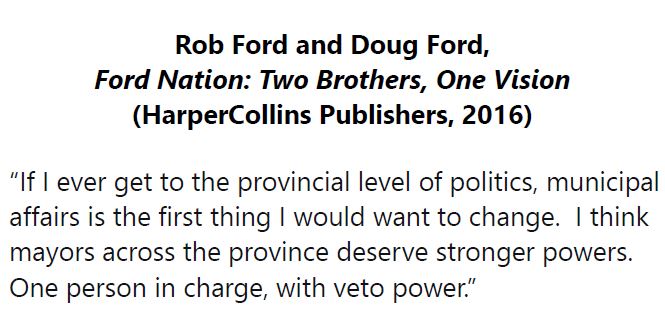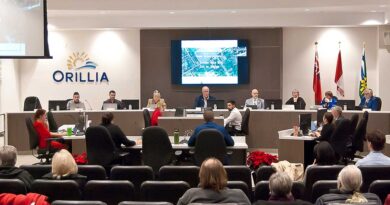Editorial: Strong Mayor Powers – Welcome To The Minefield
By John Swartz
There is one thing missing from the debate about the worth, validity and implementation, of imposing strong mayor powers on municipalities in Ontario, and that is the phrase for now.
The provincial government and many mayors of municipalities in Ontario have all made statements and declarations about how they view legislation of strong mayor powers and how it will be used, but in the last half decade we have all seen how political tradition, social tradition, rules, regulations, and even the law mean absolutely nothing regarding good governance.
Our best example is what is happening south of the border in federal and state governments, their Supreme Court, and sadly partisan media. On this side we only have to look at what is happening in Alberta and here in Ontario to understand what has worked for decades means nothing to current officeholders.
To say today the legislation and power granted to mayors will only be used one way, in the noblest of ways, and with common sense (the latter is a term that should be banned from political discourse) only works for now and will, in likelihood, mean nothing beyond the next provincial and municipal elections.
One can think about how these powers might have been used by a couple of mayors of Orillia of recent history and one notoriously colourful mayor who was elected three times in the last century. It’s not hard to imagine how those tenures in office could become case studies for George R.R. Martin. And let’s not forget things could be very much different had our last election turned out differently.
The way the legislation is written is at the same time restrictive, and loosely written and broad it is likely there will be many court cases. Some mayors will act as if they’ve been given carte blanche to do what they want, their councils and citizens will think otherwise and the way the law is written will be no help settling matters. It is even likely a mayor acting in good faith, for all the right reasons, and with plenty of justification will find themselves in hot water if their opposition is those who own this country.
The purpose of the legislation is to allow mayors to advance the priorities of the provincial government, which are stated to be to create more housing to at least the targets for the number of units built imposed by the province on municipalities. Nothing more, nothing less.
Yet, the top of the list of new powers is the ability for mayors to have sole hiring and firing of chief administrative officers in their court. This also extends to the division heads, as stated in at the top of the legislation, but is a term universally used by municipalities (director is most common) and as John Mascarin of Aird and Berlis LLP told the citizens of Orillia and council this past week, if it’s not in the legislation the door is open for litigation.
It’s important to understand that hiring and firing, particularly of chief administrative officers, is loosely tied to creating more housing, but it appears to be very appealing to mayors for not clearly defined reasons
Administrative Power
Indeed, Mayor Don McIsaac’s first use of the new power was to revoke the appointment of a newly hired, by council, chief administrative officer and install his own choice.
Last year the mayor of the town of Caledon did the same thing, and then her choice for CAO in turn, within a matter of days, fired a number of department heads (Caledon got strong mayor powers in 2024). A number of other department heads and mid-level managers saw the writing on the wall and took their own leave.
Fifteen key municipal employees were lost to the town in haste. Granted, some of those had responsibilities that are directly related to housing, but for some of them it stretches credibility to suggest there was a relationship. Critics of the situation of called it a gutting of City Hall. It’s difficult to imagine the turmoil this kind of upheaval would cause to a municipal government’s ability to function. This doesn’t even speak to the loss of institutional knowledge, why and how things came to be as they are now and what the intent of past policies, regulations and bylaws were in the context of the time they were created and the view to the future.
For decades municipalities functioned just fine as things were regarding how key officials were hired and it seems this new ability is a stick and a pot full of conundrums.
The legislation also demands mayors give written and publicly available reasoning for their decisions. One would take that to mean, euphemistically, “I took this action because…” Instead what we’re getting in the case of Orillia, and in other disclosures which have been read, is simple reference to the section of the act allowing mayors to take such action as all the reason needed.
For most people that is simply not enough.
On the part of the legislation relating to housing, it is so loosely written, and changes have been made to other legislation regarding development processes, there is a real possibility a mayor could bum rush a development into being, regardless of what the community thinks, official plans say, and zoning bylaws regulate. It is alleged this is exactly what happened in Peterborough, causing the municipality to be in litigation.
Returning to Caledon, the mayor pushed through Official Plan and 12 zoning bylaws for properties adjacent to the proposed Highway 413. The changes appear to be in direct opposition to the mayor’s election campaign positions opposing development related to the highway and critics say will make development easier.
Budget Power
Here in Orillia we have yet to see how new legislation will play out regarding the 2026 budget.
A direct line can be traced between passage of this legislation and the Ford brothers experience as members of the City of Toronto’s council. Their tenure in office there ran in direct opposition to almost the entirety of the rest of council. They didn’t like it and Doug Ford wanted to change the game rules.

In fact, Mascarin used a quotation from their book about the desire to create an autocratic system of municipal government against the tradition and will of the people. Cloaking their desire in meaningless political slogans like For The People does not make it so.
The fact the Progressive Conservative Party of Ontario and sitting MPP’s involved themselves in the campaigns of mayoral and council candidates in the last election (this happened in Orillia) in order to see their people get elected is telling
In the second round of expansion of powers to municipalities, the province offered pots of money (bribes) for housing to mayor’s and councils to sign on. Each time the powers were given to more municipalities, the reasoning had absolute nothing to do with housing. One could view it as a power grab by way of complicit municipal politicians.
Is It A Business?
Here’s another big problem with this legislation. Several mayoral candidates in several municipalities ran on their resumes as successful business people; they were going to run their towns like businesses.
In Orillia we experienced this for one term in this century and it did not work out well. CEOs have a disconnect between running their companies by decree and running government. Government is not business. It’s surely tempting, even with the best of intentions, to be able to order as one pleases as enjoyed in private business environments. That’s a captive audience. Government does not enjoy a captive audience, there are many audience’s perspective’s to account for in addition to the flawed notion government has to make money (or at the least balance the books, a good thing). Governments invest and spend money for the common good of the people they serve. The people they serve are not accounts from which to extract more money.
Sometimes, you have to spend money from the tax roll beyond the user fees collected to make your community healthy and prosperous, which is a notion which seems to escape conservative minded politicians and voters. Parks, roads, fire protection, policing, recreation and cultural facilities and activities, and transit on the face of it are money losers and need support from the tax rolls.
It is quite likely municipalities, and Orillia could be one of them, will suffer greatly because of strong mayor legislation, particularly through the budgetary provision, because of this flawed perspective government is a business.
Our parks could be developed into housing tracts, our transit systems could be destroyed to save money for housing infrastructure costs, our older roads could crumble (more) in favour of new ones to shiny, new, developer’s wet dreams, and so on, all for the decisions made by one person to get that sweet provincial grant money for housing.
Wherever we live, we have spent decades making our communities a reflection of collective selves. We stand to lose services we value, the qualities of life we wanted, and how our communities look and function. These things are in danger of being wiped out by whatever pops into the heads of mayors who can act unilaterally with business blinders on.
There is one more pitfall. While the legislation does have limits, the provisions are so broadly defined there will be a mayor that overextends the powers to areas unrelated to the singular, legislative priority of building houses, either by mission creep or intention, and they’ll get away with it. This will only serve to erode the commonly held belief why we have municipal governments and how they should function. This is not beyond the realm of possibility. One only has to look at what is happening in the federal government playground in United States and what happens in Alberta to know this is true.
And here’s a thought. If a mayor thinks his idea is so good it ought to become policy or legislated (by-laws) a mayor should be able to convince four councillors (in the case of Orillia) to go along and vote in favour. If the mayor can’t, maybe it’s just a bad idea.
(Images Supplied)




